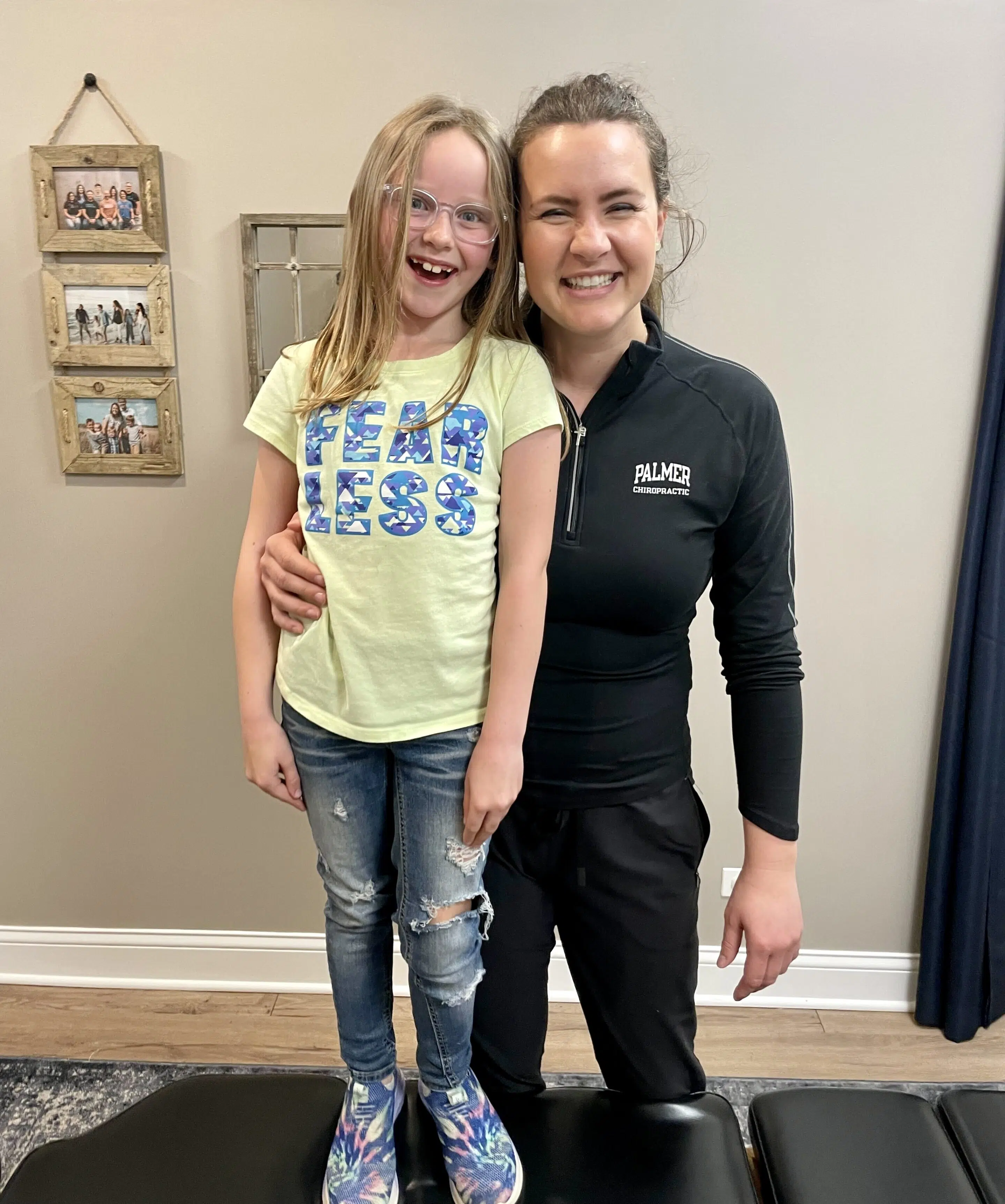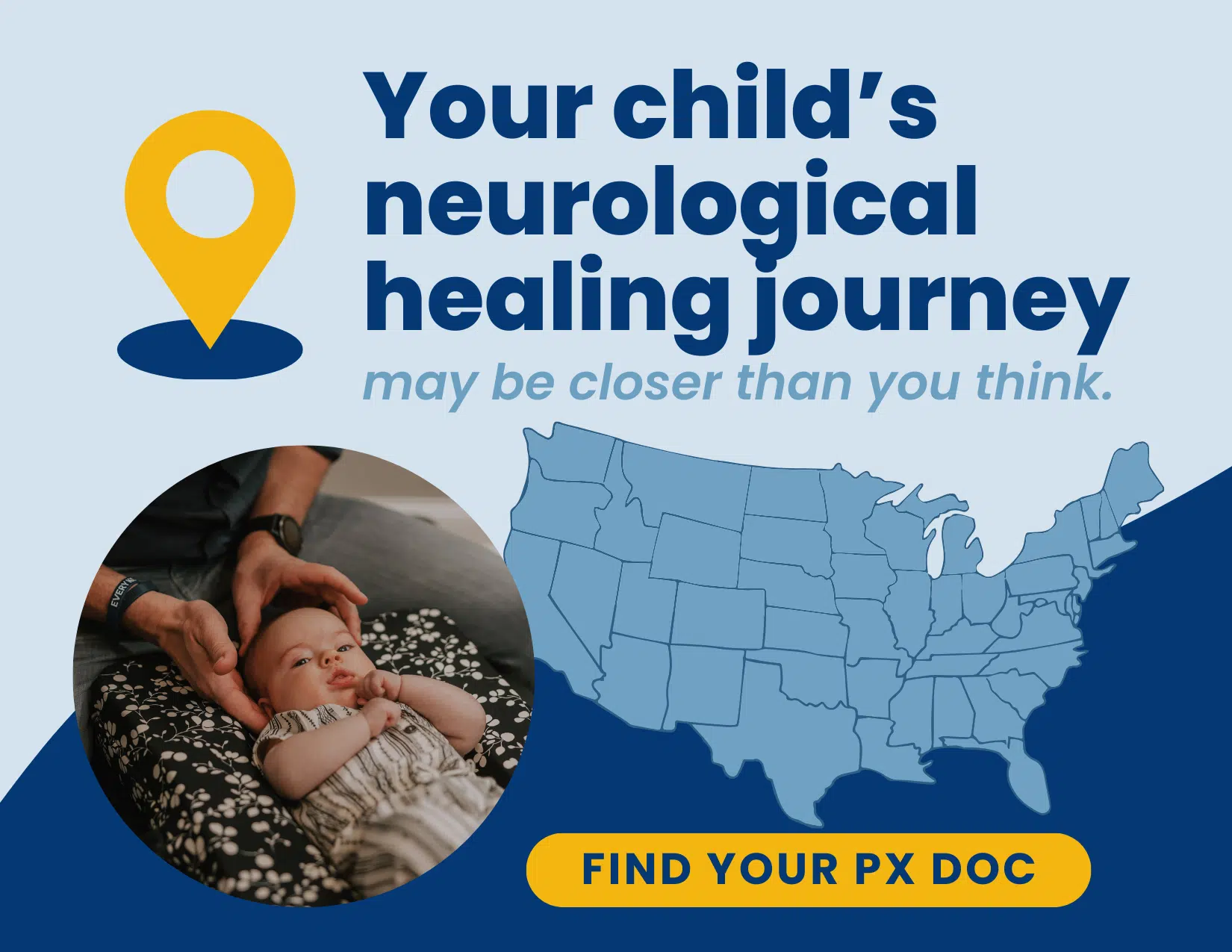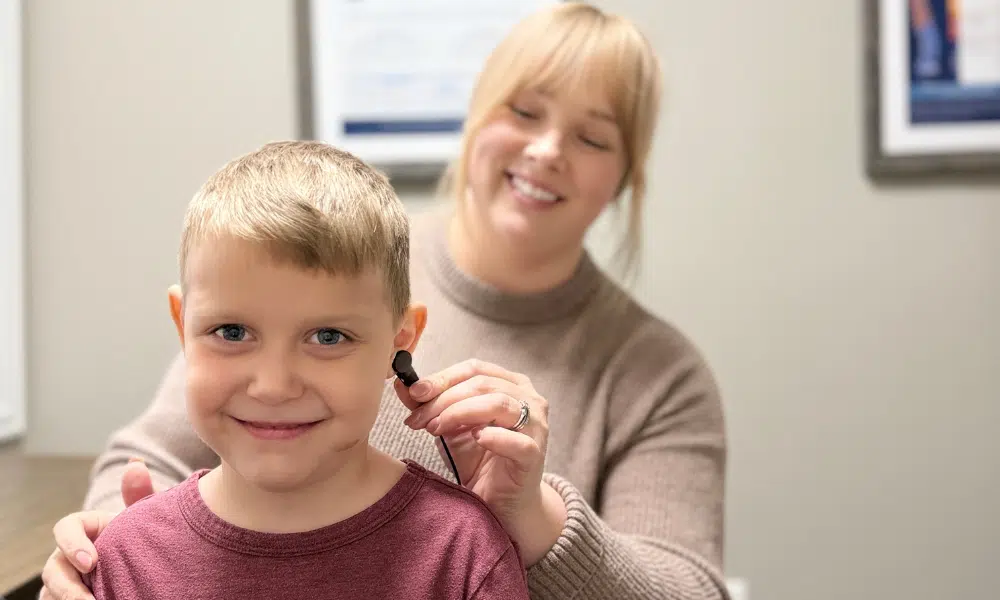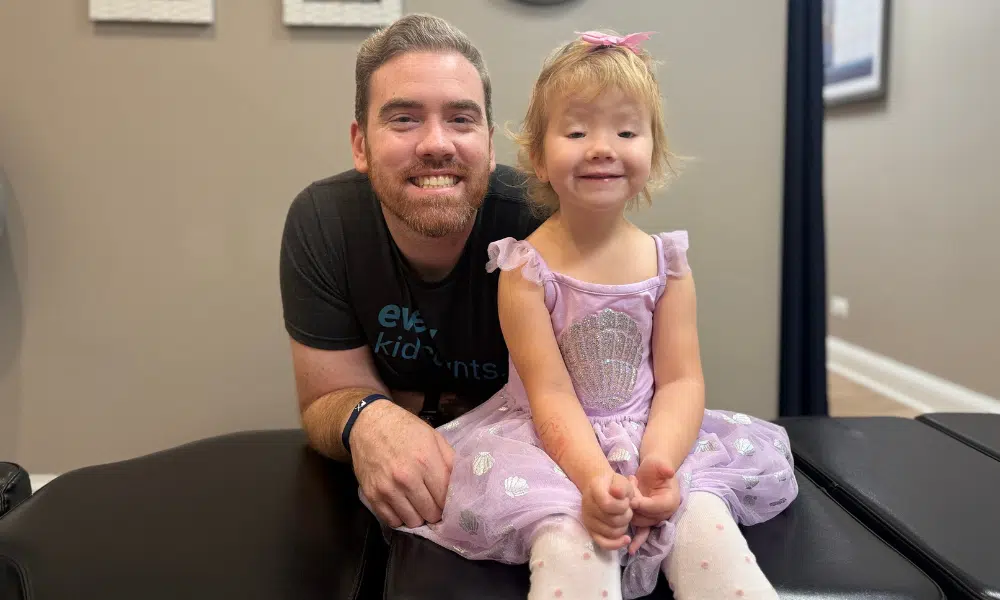What is ODD? The Neurological Roots of Oppositional Defiant Disorder
As a parent, it’s heartbreaking to see your child struggle with behavioral challenges. For Mattox’s mother, her primary goal was simple yet profound: for her son to find happiness and ease within himself. She wanted his vibrant personality to shine through and not be hidden by his defiant and disruptive behavior.
Mattox’s story is not uncommon. Oppositional Defiant Disorder (ODD), a condition characterized by a persistent pattern of angry, argumentative, and vindictive behavior towards authority figures, affects an estimated 2% to 11% of children and adolescents. For the millions of families impacted by ODD, daily life can feel like an uphill battle, causing significant stress and disruption to relationships and overall well-being.
At PX Docs, we understand the frustration and heartache of navigating ODD. That’s why we’ve dedicated ourselves to providing families like yours with hope, answers, and drug-free solutions.
Our unique approach, grounded in the latest neuroscience research, targets the underlying neurological imbalances contributing to ODD, empowering your child and adolescent to break free from the cycle of defiance and achieve lasting well-being and improved mental health.
What is ODD in Children?
Oppositional Defiant Disorder is a complex condition that can manifest in various ways. To effectively support your child, it’s essential to understand the key characteristics and diagnostic criteria of ODD.
Children with ODD exhibit a persistent pattern of mental health and behavioral issues that fall into three main categories:
- Angry/Irritable Mood: This may include frequent temper tantrums, being easily annoyed, and resentment or anger towards others.
- Argumentative/Defiant Behavior: Children with ODD often argue with authority figures, defy rules, and deliberately annoy or upset others.
- Vindictiveness: They may seek revenge or be spiteful towards others, engaging in mean or hurtful behavior.
For a diagnosis of ODD, these symptoms must be present for at least six months and cause significant disruption to the child’s daily functioning at home, school, or in social situations.
Common Co-occurring Health Conditions of ODD in Children
It’s important to note that ODD rarely exists in isolation. Research shows that up to 40% of children with ODD also have Attention-Deficit/Hyperactivity Disorder (ADHD), which can exacerbate behavioral challenges. Other commonly co-occurring health conditions include:
- Conduct Disorder: A more severe behavioral disorder involving aggression, destruction of property, and violation of social norms.
- Anxiety and Depression: Children with ODD are at higher risk for developing mood and anxiety disorders, which can further complicate care plans.
Recognizing and addressing these co-occurring conditions is crucial for developing a comprehensive care plan that meets your child’s unique needs.
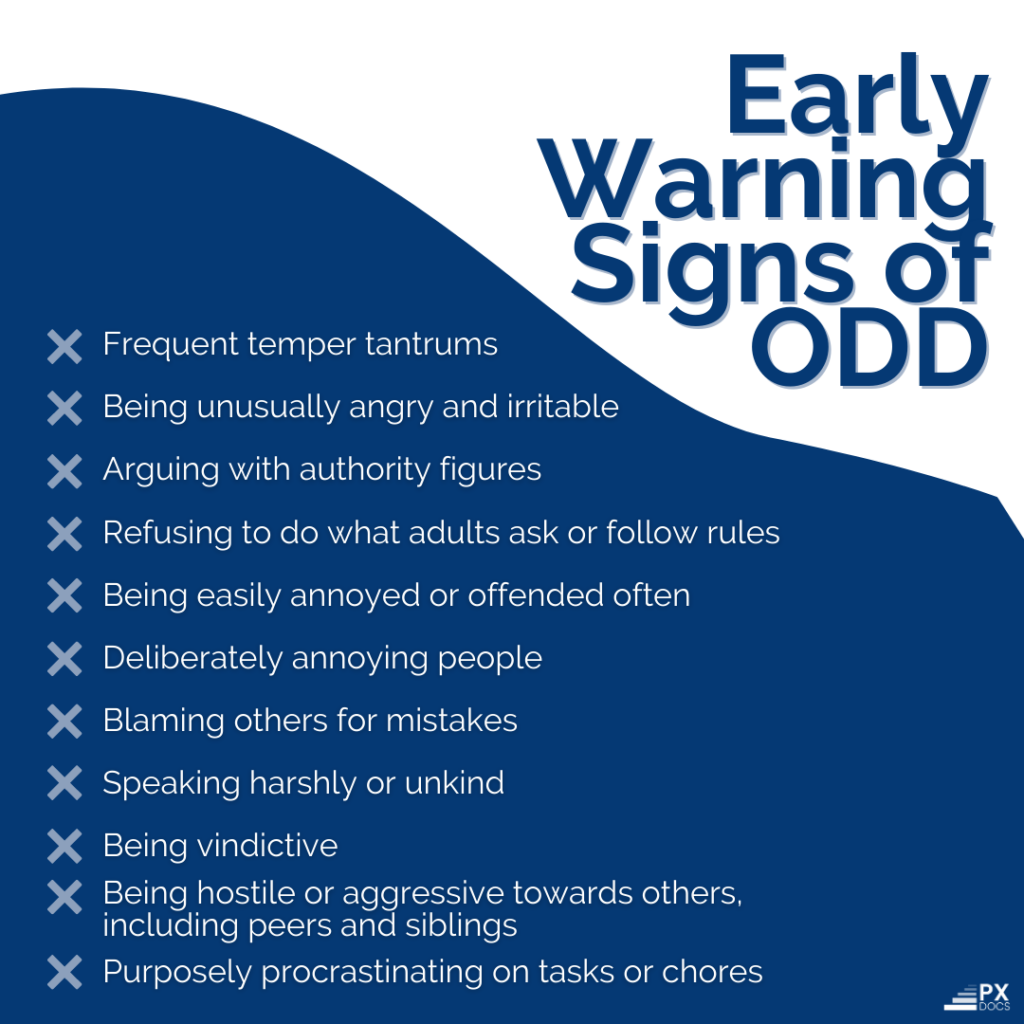
What Does Oppositional Defiant Disorder Turn Into?
ODD can have far-reaching consequences that extend well beyond childhood if left unaddressed. Research shows that individuals with a history of ODD are more likely to experience:
- Academic difficulties and school dropout
- Substance abuse and addiction
- Legal problems and incarceration
- Relationship challenges and family conflict
- Employment instability and financial hardship
These long-term mental health effects underscore the importance of early skills training and a holistic approach to care that addresses the root causes of ODD rather than simply managing it.
The Neurological Roots of ODD
At PX Docs, we understand that addressing the core of your child’s challenges requires a deep understanding of the complex interplay between the brain, nervous system, and behavior.
The autonomic nervous system (ANS), for example, plays a crucial role in regulating our body’s unconscious functions, including heart rate, digestion, and emotional responses. It consists of two main branches:
- Sympathetic Nervous System (SNS): Often referred to as the “fight or flight” response, the SNS is activated during stress or perceived danger, preparing the body for action.
- Parasympathetic Nervous System (PNS): Known as the “rest and digest” response, the PNS helps the body conserve energy, recover from stress, and maintain a state of calm.
In children with ODD, there is often an imbalance between these two branches, with an overactive SNS and an underactive PNS. This nervous system dysregulation can lead to heightened emotional reactivity, impulsivity, difficulty self-soothing, and other mental health challenges—all hallmark traits of ODD.
The central nervous system (CNS) also plays a critical role in regulating behavior. CNS dysfunction, including subluxation, can also lead to nervous system dysregulation, affecting emotional control and stress responses.
In conditions like Oppositional Defiant Disorder (ODD), this dysregulation may manifest as impulsivity, mood swings, and difficulties managing emotions. Subluxations can interfere with the CNS’s ability to communicate effectively with the body, leading to a heightened “fight or flight” response, which may contribute to behavioral challenges. Addressing these subluxations through chiropractic care may help restore balance and improve behavior regulation.
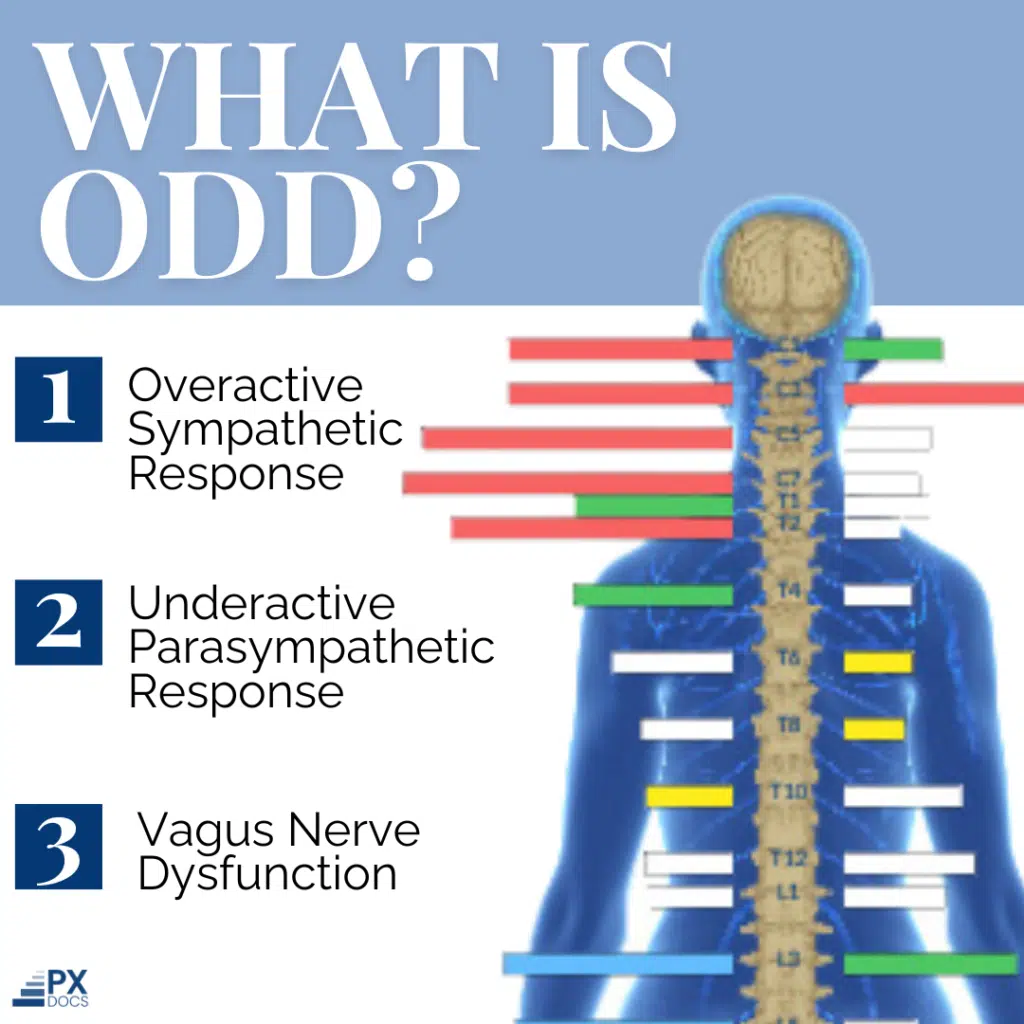
Vagus Nerve Dysfunction and ODD
At the heart of this autonomic imbalance lies the vagus nerve, a critical component of the parasympathetic nervous system. The vagus nerve is responsible for a wide range of functions, including:
- Regulating heart rate and blood pressure
- Controlling digestive processes
- Modulating inflammation and immune responses
- Facilitating communication between the brain and gut
- Regulating emotions, behavior, social interactions, communication, and cognition
When the vagus nerve is functioning optimally, it helps promote a state of calm and emotional well-being. However, research suggests that children with ODD often have lower vagal tone, indicating a reduced capacity for emotional regulation and stress resilience.
Vagus nerve dysfunction can be caused by a variety of factors, including birth trauma, chronic stress, and inflammation. When left unaddressed, this dysfunction can perpetuate the cycle of emotional dysregulation and behavioral challenges seen in ODD.
“The Perfect Storm” of ODD Development
At PX Docs, we recognize that ODD rarely develops in isolation. Instead, it often emerges as the result of a “Perfect Storm” of factors that converge to disrupt a child’s neurological development:
- Prenatal Stress and Maternal Health: Maternal stress during pregnancy can have a profound impact on fetal brain development, potentially setting the stage for future emotional and behavioral challenges.
- Birth Trauma and Interventions: Complications during labor and delivery, such as prolonged labor, forceps or vacuum extraction, or cesarean section, can cause physical stress to the infant’s delicate nervous system.
- Early and Frequent Exposure to Antibiotics and Medications: Early exposure to antibiotics and toxins can disrupt the gut microbiome and nervous system, leading to imbalances that may affect mood regulation and impulse control, contributing to behavioral issues like ODD.
- Early Life Stressors and Environmental Factors: Exposure to toxic stress, such as abuse, neglect, sensory overload, or family instability, during critical periods of brain development can alter the functioning of the ANS and predispose a child to ODD.
By understanding the complex interplay of these factors and their impact on the developing nervous system, we can unravel ODD’s neurological roots and develop targeted interventions that promote healing and resilience.
In the next section, we’ll explore how conventional approaches to ODD treatment often fail to address these underlying neurological imbalances and how PX Docs’ Neurologically-Focused Chiropractic Care offers a promising drug-free alternative.
The Limitations of Conventional Medication for ODD
When faced with a child with ODD, many parents turn to conventional “treatment” options, such as medication and behavioral therapy. While these approaches can provide some relief, they often fail to address the underlying neurological imbalances contributing to ODD.
Psychotropic medications, such as stimulants, antidepressants, and antipsychotics, in particular, are often prescribed to manage ODD. While these medications can help reduce impulsivity, aggression, and emotional reactivity in the short term, they come with several drawbacks:
- Side Effects: Many psychotropic medications have significant side effects on physical and mental health, such as weight gain, sleep disturbances, and emotional blunting, which can further compromise a child’s quality of life.
- Dependency and Long-term Consequences: Long-term use of psychotropic medications can lead to physical dependence and potentially interfere with a child’s natural brain development.
- Lack of Specificity: Medications often target symptoms rather than the root cause of ODD, failing to address the underlying neurological dysfunction that perpetuates the cycle of problematic behavior.
Relying solely on medication without addressing the foundational neurological issues will limit long-term success and healing.
The Challenges of Behavioral Therapy
Behavioral interventions, such as parent management training and cognitive-behavioral therapy, are often recommended for children with ODD. These approaches aim to provide children with skills training and to help parents develop more effective strategies for managing challenging behaviors.
While behavioral therapies can be valuable tools, they also have their limitations:
- Time and Consistency: Behavioral interventions require significant time, effort, and consistency from the child and the family to be effective. Maintaining the necessary level of engagement can be challenging in the face of daily stressors and competing demands.
- Addressing Neurological Dysfunction: Traditional behavioral therapies often focus on modifying observable behaviors without directly targeting the underlying neurological imbalances that contribute to ODD. Without addressing these foundational issues, progress may be limited or short-lived.
- Co-occurring Conditions: Children with ODD often have co-occurring conditions, such as ADHD or anxiety, which can complicate the effectiveness of behavioral interventions. A comprehensive approach that addresses the full spectrum of a child’s needs is essential for lasting success.
At PX Docs, we recognize the value of a multi-disciplinary approach to caring for children with ODD, combining the best conventional and alternative methods. However, we also understand that without addressing the core neurological dysfunction, many children will continue to struggle.
For further clarity on this specific component and challenge, listen to our podcast interview with a Behavioral Specialist mother whose child was not responding to any interventions until receiving Neurologically-Focused Chiropractic Care. This will really put these challenges and the importance of properly “sequencing” or ordering care options into perspective.
The PX Docs Approach: Neurologically-Focused Chiropractic Care
At PX Docs, we understand that lasting change requires a different approach—one that targets the root cause of your child’s challenges. Our Neurologically-Focused Chiropractic Care is designed to address the underlying imbalances in the autonomic nervous system that contribute to ODD, providing a foundation for long-term healing and resilience.
Our approach is grounded in the understanding that proper nervous system function is essential for overall health and well-being. When the nervous system is interfered with or imbalanced, known as subluxation, it can lead to wide-reaching challenges, including those associated with ODD.
If subluxation and nervous system dysregulation are not first and foundationally addressed, other interventions like various parenting approaches and behavioral therapy will be limited in their expected results. In contrast, parents and providers alike frequently report such positive change and transformation when a child is getting adjusted and their nervous system becomes regulated and adaptable once again. Then parenting, behavioral interventions, and even things like diet changes can have much greater uptake and responsiveness.
Mattox’s Story: A Journey of Transformation
When Mattox first came to PX Docs, his family was at a breaking point. Despite their best efforts, Mattox’s defiant behavior and emotional outbursts took a toll on everyone’s mental health. Through our neurologically-focused approach, we identified significant imbalances in Mattox’s autonomic nervous system and developed a targeted care plan to address his unique needs.
Below are Mattox’s initial EMG Scans, which show significant amounts of neurosensory tension, dysfunction, and dysregulation throughout his nervous system. When an EMG Scan is full of reds and blacks like indicated and shown on the upper left, and then also with the severe counter-torque tension in the cervical (neck) region as indicated and shown on the lower left view, this leaves the child’s entire brain and nervous system locked into severe sympathetic overdrive and sensory overload.
As Mattox progressed through care, his family began to notice remarkable changes. He was calmer, more cooperative, and better able to regulate his emotions. Meltdowns became less frequent, and Mattox could engage more positively with his family and peers.
Today, Mattox is thriving—his vibrant personality shines through, no longer overshadowed by the challenges of ODD. His story is a testament to the life-changing potential of Neurologically-Focused Chiropractic Care and the resilience of the human body when given the right support.
Finding Hope and Healing for Your Child with ODD
Navigating the challenges of ODD can be overwhelming, leaving you feeling helpless and unsure where to turn. At PX Docs, we want you to know that there is hope. By addressing the root cause of your child’s struggles and providing compassionate, Neurologically-Focused Chiropractic Care, countless families transform their lives, improve their mental health, and rediscover the joy of connection and well-being.
If you’re ready to take the first step towards lasting change, we invite you to visit our PX Docs Directory and find a skilled practitioner near you. With the right support and guidance, your child—and your entire family—can experience the freedom and resilience that comes from a balanced, healthy nervous system.
Don’t let ODD define your child’s story. Embrace the possibilities that await and embark on a journey of healing and growth with PX Docs. Your child’s optimal potential and incredible personality is waiting to shine through—let us help you unlock their full potential and create a brighter future for your family!
– Dr. Tony Ebel
PS. Are you a parent who absolutely loves to learn as much as you can, including all the science and neurology behind your child’s health challenges like ODD? If so, be sure to dig into our incredible online webinar all about “The Perfect Storm” and more! It’s just a half hour so you can squeeze it in over lunch or just after the kids go to bed! Gain access to this life-changing webinar here.

